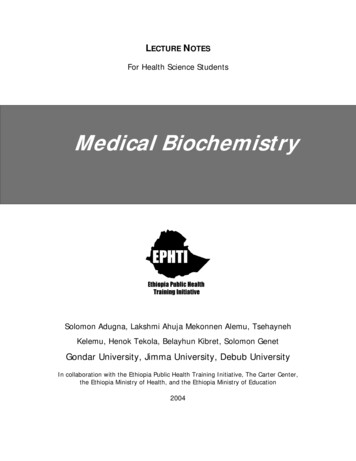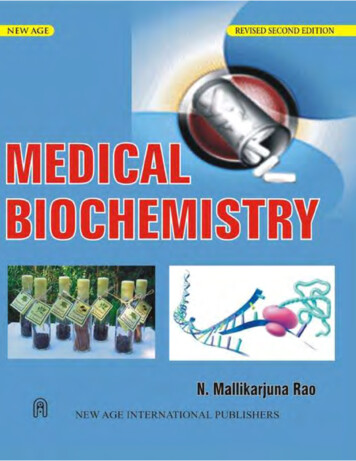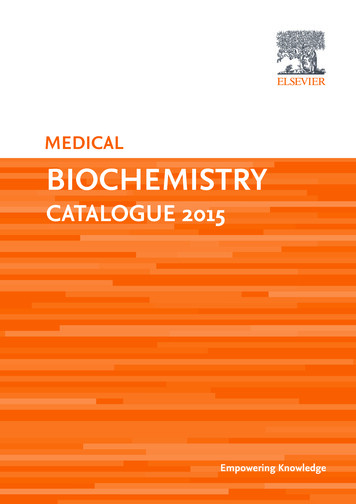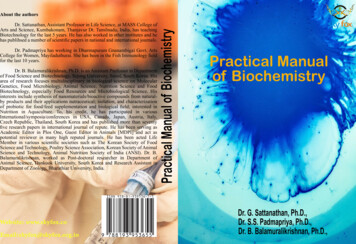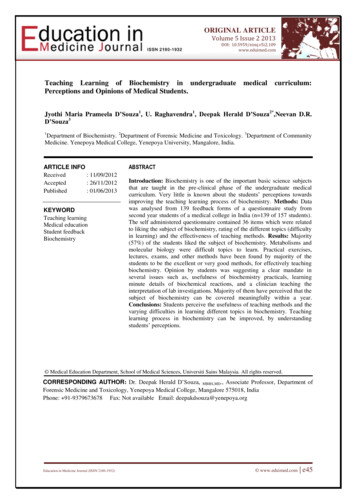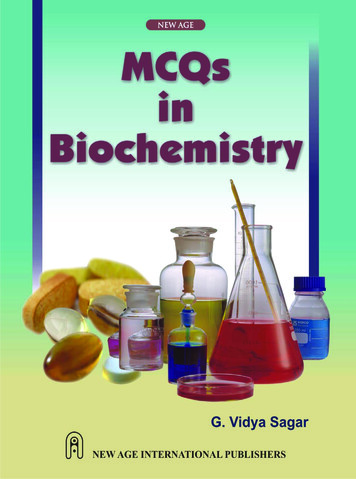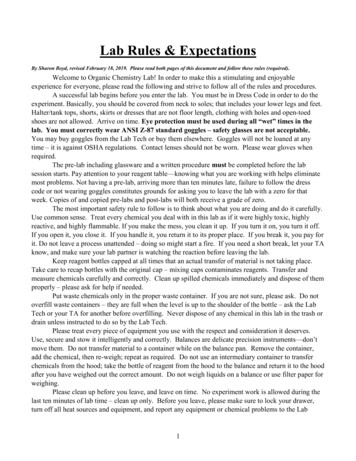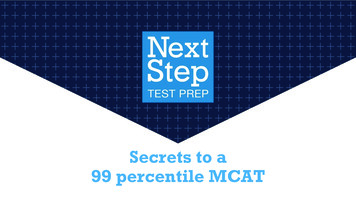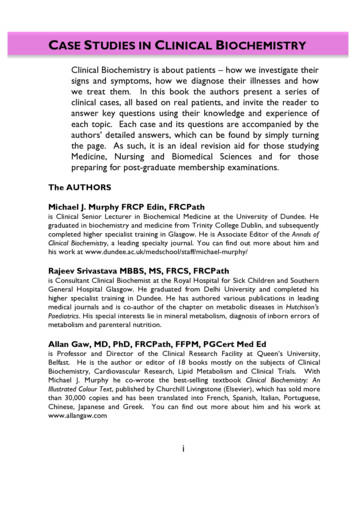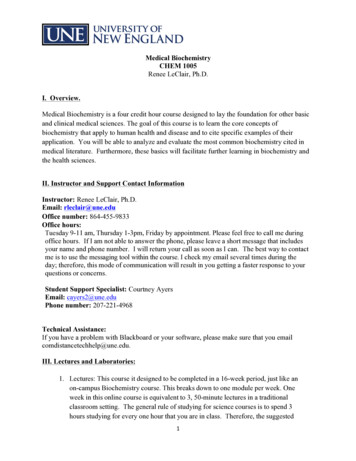
Transcription
Medical BiochemistryCHEM 1005Renee LeClair, Ph.D.I. Overview.Medical Biochemistry is a four credit hour course designed to lay the foundation for other basicand clinical medical sciences. The goal of this course is to learn the core concepts ofbiochemistry that apply to human health and disease and to cite specific examples of theirapplication. You will be able to analyze and evaluate the most common biochemistry cited inmedical literature. Furthermore, these basics will facilitate further learning in biochemistry andthe health sciences.II. Instructor and Support Contact InformationInstructor: Renee LeClair, Ph.D.Email: rleclair@une.eduOffice number: 864-455-9833Office hours:Tuesday 9-11 am, Thursday 1-3pm, Friday by appointment. Please feel free to call me duringoffice hours. If I am not able to answer the phone, please leave a short message that includesyour name and phone number. I will return your call as soon as I can. The best way to contactme is to use the messaging tool within the course. I check my email several times during theday; therefore, this mode of communication will result in you getting a faster response to yourquestions or concerns.Student Support Specialist: Courtney AyersEmail: cayers2@une.eduPhone number: 207-221-4968Technical Assistance:If you have a problem with Blackboard or your software, please make sure that you emailcomdistancetechhelp@une.edu.III. Lectures and Laboratories:1. Lectures: This course it designed to be completed in a 16-week period, just like anon-campus Biochemistry course. This breaks down to one module per week. Oneweek in this online course is equivalent to 3, 50-minute lectures in a traditionalclassroom setting. The general rule of studying for science courses is to spend 3hours studying for every one hour that you are in class. Therefore, the suggested1
study time for each module is 9 hours above and beyond the time it takes to listen tothe lecture. Please refer to the schedule below for the suggested schedule of lectures.Students may complete the course in less than 16 weeks.Each module consists of: Session level objectives Reading from Marks Medical Biochemistry Pre – Quiz (see below section VII for description) Voice over PowerPoint and associated slides Additional learning resources Module evaluation (see below section VII for description)2. Laboratories: N/AIV. Required materials- Textbook: Marks Basic Medical Biochemistry: A Clinical Approach, 4th edition. Leibermanand MarksV. Course ObjectivesUpon the completion of this course the student will be able to:1. Identify functional groups unique to proteins, nucleic acids, lipids, and carbohydrates anddescribe their relevance in biological systems.2. Interpret the role and regulation of metabolism of proteins, carbohydrates, lipids, and nucleicacids in normal physiological conditions and the changes that occur in disease processes.3. Identify and evaluate methodologies for molecular and biochemical diagnostic testing inindividuals and populations.4. Demonstrate an understanding of cellular structure, compartmentalization, trafficking, andcellular signaling5. Explain genomic, DNA and RNA structure and the central dogma of molecular biology,including the processes of DNA replication, transcription, and translation across eukaryotes.6. Explain how changes in genetic and environmental factors can result in the displayed geneticvariation in human populations.7. Understand how enzymes facilitate chemical reactions and the necessity of metaboliccofactors or vitamins in these reactions; relate how these may have pharmacologicalapplications.2
VI. Course OutlineThe table below gives a general outline of the material. For more detailed readings please followthe Module information on Blackboard.UNIT 1:Cellular fundamentals and applications of molecular biologyModule 1: Biochemistry basics and enzymologyCourse Objectives: 1,7ChaptersSession 1:At the end of this module the learner will:be able to illustrate the importance of key compounds inbiological settings and the necessity of biological buffers. Itwill also provide an understanding of enzymes and theirrelevance in biological reactions.4Water, Acids, Bases andBuffers6Amino Acids in Proteins7Structure-FunctionRelationships in ProteinsSession 2:8Enzymes as Catalysts9Regulation of EnzymesModule 2: Cellular CommunicationCourse Objectives: 1,4Chaptersbe able to explain how cells communicate and integratesignals resulting in a cellular or physiological change.10Relationship between cellbiology and biochemistry11Cell Signaling by ChemicalMessengersModule 3: Central Dogma - DNA structure and synthesisCourse Objectives: 1,2,3,5,6ChaptersSession 1:be able to describe the structure and synthesis ofnucleotides. Students will be able to relate the phases of thecell cycle to DNA replication and repair processes.312Nucleotide structure41Purine and PyrimidineSynthesis and Salvage
Session 213DNA SynthesisModule 4: Central Dogma - Transcription and TranslationCourse Objectives: 1,5Chaptersto describe the flow of genetic information from DNA to thelevel of protein synthesis.14Transcription15TranslationModule 5: Gene regulation and diagnostic evaluationCourse Objectives: 1,3,6ChaptersSession 1:be able to integrate information from previous modules andillustrate how cells sense and regulate gene expression. Thelearner will also be able to understand how to evaluate thesechanges at a molecular level using cutting edge moleculartechnologies.16Regulation of GeneexpressionSession 2:17Use of Recombinant DNATechniques in MedicineModule 6: Amino acids as specialized productsCourse Objectives: 1,6,7Chapters39be able to evaluate how defects in amino acid metabolism areinherited and how accumulation of intermediary metabolitescan be used to clinically diagnose these disorders.40Synthesis anddegradation of aminoacidsTetrahydrofolate, VitaminB12, and SAdenosylmethionineUNIT 2: Generation of Energy and Carbohydrate MetabolismModule 7: Generation of energyCourse Objectives:2,7Chaptersbe able to relate the free energy of a reaction with itsdirectionality. The learner will also be able to describe therelevance and generation of ATP within the cell.Module 8: Carbohydrate Metabolism419Cellular Bioenergetics21Oxidation phosphorylation
Course Objectives: 1,2ChaptersSession 1:26be able to summarize carbohydrate, fat and amino acidmetabolism and the interrelationship of various tissues.Specifically, the learner will assess the metabolic fate ofcarbohydrates following digestion.Basic concepts in theregulation of Fuelmetabolism by insulin,glucagon and otherhormones.Session 2:27Digestion, absorption andtransport of carbohydrates22Generation of ATP fromGlucose: Glycolysis28Formation andDegradation of GlycogenModule 9: TCA cycleCourse Objectives: 1,2Chaptersbe able to describe the role and regulation of the TCA cyclein generating reducing equivalents and substrates forintermediary metabolism.20Tricarboxyilic Acid CycleModule 10: Alternative glucose metabolism and the RBCCourse Objectives: 1,2Chapters:Session 1:be able to discuss alternative pathways for glucosemetabolism; specifically glucose metabolism within the redblood cell and the necessity of NADPH.29Pathways of Sugarmetabolism: PentosePhosphate Pathway,FructoseSession 2:44The Biochemistry ofErythrocytes and otherblood cellsUNIT 3: Lipid metabolism and integrated metabolismModule 11: Digestion, circulation and synthesis of lipidsCourse Objectives: 1,2Chaptersbe able to illustrate how lipids are digested, transported to theperiphery and synthesized. The learner will also assess how5Session 1:
these processes are hormonally regulated.32Digestion and transport ofDietary LipidsSession 2:33Synthesis of Fatty acids,Triacylglycerols and MajorMembrane LipidsModule 12: Cholesterol synthesis and lipoprotein metabolismCourse Objectives: 1,2Chaptersbe able to interpret the circulation of both dietary andendogenous cholesterol as well as determine how thisimpacts de novo cholesterol synthesis. The learner will alsodetermine the interrelationship VLDL and HDL metabolism34Cholesterol absorption,synthesis and metabolismModule 13: Maintenance of blood glucoseCourse Objectives: 1,2ChaptersSession 1:31be able to describe the necessity and hormonal regulation ofgluconeogenesis and the maintenance of blood glucose.33Gluconeogenesis andMaintenance of BloodGlucoseSynthesis of Fatty acids,Triacylglycerols and MajorMembrane LipidsSession 2:25Metabolism of EthanolUNIT 4: Hormonal control of metabolism and metabolic acidosisModule 14: Protein digestion and the urea cycleCourse Objectives: 1, 2,3,6Chaptersto be able to asses the amino acid pool within the body anddetermine the relative flux thru the urea cycle based onprotein catabolism.37Protein Digestion andAmino Acid Absorption38Fate of Amino AcidNitrogen: Urea cycleModule 15: Fasted state and Metabolic AcidosisCourse Objectives: 1, 2,3,6Chaptersbe able to determine metabolic adaptations that occur duringthe fasting state and to confidently revisit the integration of63Fasting
intermediary metabolism within the liver, brain, kidney,skeletal muscle and adipose.36Integration of carbohydrateand Lipid metabolism42Interrelationships of Aminoacids with other tissuesModule 16: Additional hormones that impact metabolismCourse Objectives: 2,3Chaptersbe able to integrate the actions of alternative hormones onthe discussed metabolic pathways to facilitate integration ofmetabolism across tissues.43Actions of Hormones thatRegulate Fuel MetabolismVII. Examination and Grading Information.Students will have the opportunity to assess their knowledge with both formative and summativeevaluations. Each module consists of both a Pre-module quiz (formative), and a post Moduleevaluation (summative). Each unit has an associated summative exam; exams after Units 2 andUnits 4 are cumulative and proctored.Description of Assessments:Pre-module Quiz:To evaluate your preparedness for the Module there are Pre-module quizzes linked for eachsession. You can take these quizzes multiple times and are a good resource for the Unit examsand Module evaluations. These quizzes do not contribute to your final grade.Module Evaluations:All modules have an end of module evaluation. These many be in the form of a multiplechoice quiz or a ‘Madlib’ which is a fill-in the blank exercise. These quizzes are timed, nonproctored and are closed notebook and closed notes. The quizzes will be taken online throughthe course Blackboard site. Doing well on the quizzes will help prepare you for the timedproctored exams.Unit Exams:There will be a total of 4 exams in the course, one after each of the 4 Units. Exams afterUnits 1 and 3 will be taken through Blackboard and are not cumulative. Exams after Units 2and 4 are cumulative and will be taken using Proctor U (see below for instructions).Units 1 and 3 exams:Each exam will consist of 30 multiple choice questions that cover all of the material in therespective unit, these will be taken on Blackboard similar to a Module evaluation and are closednotes, closed book. You will have up to 1.5 hours to complete these exams.Units 2 and 4 exams:Each exam will consist of 50 multiple choice questions that cover all of the material from the7
respective unit, as well as up to 10% of material from previous units. These exams will be takenusing one of the outlined proctoring procedures below. These are closed book and closed notesexams. You will not have access to any material saved on your or any other computer. Noaccess to the internet or other communication devices is allowed during these exams.Retaking a Unit 2 or Unit 4 exam:You will have the option of retaking either the Unit 2 or Unit 4 exam if requested. You will beresponsible for rescheduling the exam with Proctor U and the cost of the proctoring. Your finalgrade for the assessment will be the average of the two scores. We strongly encourage studentswho score below 50% on the Unit 2 exam to retake this assessment, as this background isfundamental to the other two Units.Final Grade:The course grade will be determined using the weighted averages of each of theassessments outlined above.Module Evaluations 20%Unit 1 and 3 Exams 20%Unit 2 and 4 Exams 60%Exam Procedures:Students can either take their final proctored exam online using Proctor U or at the campus ofthe University of New England.Proctored Examinations.The University of New England has contracted with ProctorU (proctoru.com) to provide studentswith the most convenient online exam proctoring system. This system provides a simple, no costto the student, secure, online proctor for all exams and allows the student to take all of the examsat home and on their own schedule.Upon enrollment into the course, each student will register with ProctorU and establish a loginname and password. This will give you access to all of ProctorU’s services. When ready,students will schedule their exams with ProctorU one week prior to taking that exam. Upon theexam day and hour, students will log in to proctor U and click on “exams”.Following the procedures outlined at ProctorU’s web site, the student will log in to Blackboard;open the appropriate exam and the proctor will then allow student access to that exam.Students will need to plan on, and schedule through ProctorU, a total of 1.5 consecutive hoursfor each of the 4 module exams - one hour for each Module lecture exam and 30 min for eachModule laboratory exam, both done in the same 1.5 hour time block. You need not schedule allof the exams at once, but each one must be scheduled at least one week in advance of the actualexam date.8
System Requirements for Use of ProctorU:-PC: Windows XP, Windows Vista or Windows 7 with 256 MB of RAM or higherMac: Mac OS10 or higherA web cam with 640x480 video pixel resolutionHeadphones or working speakers connected to the computerA microphone connected to the computer (we recommend having a web cam that has abuilt in microphone)A high speed internet connection (NO DIAL-up). We recommend connecting yourcomputer directly to your router with an Ethernet cable for any proctored exams,specially the practical exams.A web browser with Adobe Flash Player installed. (Google Chrome recommended forProctorU website)Authority to allow remote access to your computer and screen by one of our proctorsWritten Proctored Exam: Students may take the exam at the University of New EnglandCollege of Osteopathic Medicine's Campus. The exam is offered the first Saturday of everymonth. If the first Saturday of the month is a holiday, the exam will take place on the secondSaturday of the month. Please contact us for information at comdistance@une.edu.Grading Scale88% -100% A82% - 87% B 78% - 81% B72 %– 77% C 68% - 77% C60% - 67% DBelow 60% FVIII. Course LengthNote the following:A schedule of lectures and assignments is included in this syllabus. This is, however a selfpaced course and you can complete the course in less time.1. Courses in CDE program are equivalent to one-semester courses designed to be completed in16 weeks2. Enrollment in the course begins the day your section opens, which is listed in the AcademicCalendar, found on the CDE Webpage.3. Students for whom a grade has not been posted by week 14 will be flagged by theadministrative staff.IX. Learning Disabilities.Any student with a documented learning disability needing academic adjustments oraccommodations is requested to notify the professor prior to or during the first week of being inthe course. All discussions will remain confidential. All students with a documented learningdisability will need to provide all necessary documentation before special accommodations will9
be granted. Accommodations will be granted for the midterm and final exams only, as thequizzes are not timed.To request accommodations at the University of New England, please contact:Jaime L. Flaig, M.EdCoordinator of Disability ServicesPhone: (207) 221-4418Fax: (207) 523-1919Page xEmail: jflaig@une.eduX. Withdraw Policies.To withdraw from a course, please e-mail UNERegistrar@une.edu with your intentions towithdraw and include the course subject and number (Example: ANAT 1005). This action willresult in a W grade for the course. You must declare your intention to withdraw beforecompleting all of the graded assessments.Refund Policy: 100% refund prior to the official start of the course. 40% refund within the first week of the official course start date. No refund after the first week of the official course start date.For further information concerning refunds, please I. Transcripts.Due to the Family Privacy Act, the student may only request official transcripts. This may bedone online by going to the University of New England Registrar website and following thedirections on the page. The URL is: . Fill inand sign the request and either mail or fax it to the University Campus address on the form.To view your unofficial UNE student transcript: Log into uonline at http://uonline.une.edu Select Student Services Select Student Records Select Academic Transcript10
Medical Biochemistry CHEM 1005 Renee LeClair, Ph.D. I. Overview. Medical Biochemistry is a four credit hour course designed to lay the foundation for other basic and clinical medical sciences. The goal of this course is to learn the core concepts of biochemistry that apply to human
